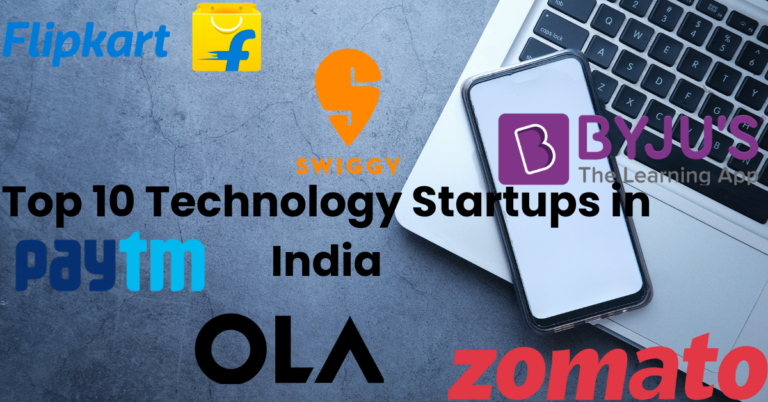Top 10 Financial Inclusion Startups in India
Discover the Top 10 Financial Inclusion Startups in India revolutionizing access to banking, loans, and digital payments. From Paytm Payments Bank to Aye Finance and Jio Payments Bank, these startups are leveraging technology to empower underserved communities across the country. Financial inclusion has become a critical aspect of economic development in India, aiming to provide accessible and affordable financial services to underserved and marginalized communities. Startups in this sector are leveraging technology and innovative business models to bridge the gap and bring financial services to those who have traditionally been excluded. Here’s a look at the top 10 financial inclusion startups making significant strides in India:
Table of Contents
1. Paytm Payments Bank
Paytm Payments Bank, founded in 2017 by Vijay Shekhar Sharma, operates from Noida, Uttar Pradesh. It focuses on providing digital banking services through its mobile app, offering seamless digital transactions, zero-balance savings accounts, and a range of financial products. Paytm Payments Bank aims to empower both urban and rural populations in India by making financial services accessible and convenient.
| Name | Paytm Payments Bank |
| Founder | Vijay Shekhar Sharma |
| Founded | 2017 |
| Location | Noida, Uttar Pradesh |
| Overview | Paytm Payments Bank offers digital banking services through its app, focusing on digital payments, savings accounts with no minimum balance, and other financial products to promote financial inclusion in India. |
Paytm Payments Bank: Paytm Payments Bank is a leading player in digital payments and financial services, offering banking services through its mobile app. Launched in 2017, it focuses on providing seamless digital transactions, savings accounts with zero minimum balance requirements, and other financial products aimed at inclusion.
Also read: Top 10 Gig Economy Startups in India
2. Jio Payments Bank
Established in 2018 and based in Mumbai, Maharashtra, Jio Payments Bank is backed by Reliance Industries. It integrates telecom infrastructure with financial services, offering digital payment solutions, savings accounts, and tailored financial products. Jio Payments Bank leverages its extensive reach through Reliance Jio’s network to serve diverse customer segments across India, contributing to financial inclusion efforts.
| Name | Jio Payments Bank |
| Founder | Reliance Industries |
| Founded | 2018 |
| Location | Mumbai, Maharashtra |
| Overview | Jio Payments Bank combines telecom infrastructure with financial services, offering digital payments, savings accounts, and financial products designed to cater to both rural and urban populations in India. |
Jio Payments Bank: Backed by Reliance Jio, Jio Payments Bank combines telecom infrastructure with financial services. It offers a range of banking services through its app, including digital payments, savings accounts, and access to financial products tailored to the needs of rural and urban customers alike.
Also read: Top 10 Data Privacy Startups in India
3. Aye Finance
Founded in 2014 and headquartered in Gurugram, Haryana, Aye Finance specializes in micro-enterprise lending. Led by Sanjay Sharma, the startup uses innovative credit assessment techniques to provide loans to small businesses without traditional credit histories or collateral. Aye Finance aims to foster entrepreneurship and economic growth by catering to the financial needs of underserved micro-enterprises across India.
| Name | Aye Finance |
| Founder | Sanjay Sharma |
| Founded | 2014 |
| Location | Gurugram, Haryana |
| Overview | Aye Finance specializes in micro-enterprise lending, using innovative credit assessment techniques to provide loans to small businesses without traditional credit histories or collateral, thereby promoting economic growth and entrepreneurship. |
Aye Finance: Aye Finance specializes in micro-enterprise lending, targeting businesses that lack credit histories or collateral. Using a unique credit assessment methodology based on data analytics and psychometric tools, Aye Finance provides loans to small businesses to foster entrepreneurship and economic growth.
Also read: Top 10 E-learning Startups in India
4. Eko Financial Services
Eko Financial Services, established in 2007 and based in New Delhi, acts as a banking correspondent. Founded by Abhishek Sinha, the startup facilitates last-mile financial transactions through a network of retail agents. Eko Financial Services focuses on providing basic financial services such as remittances, savings, and insurance to underserved communities, bridging the gap between formal financial institutions and the unbanked.
| Name | Eko Financial Services |
| Founder | Abhishek Sinha |
| Founded | 2007 |
| Location | New Delhi, Delhi |
| Overview | Eko Financial Services acts as a banking correspondent, enabling last-mile financial transactions through a network of retail agents. It focuses on providing basic financial services such as remittances, savings, and insurance to underserved communities in India. |
Eko Financial Services: Eko Financial Services operates as a banking correspondent, enabling last-mile financial transactions through its network of retail agents. It focuses on offering basic financial services such as remittances, savings, and insurance to underserved populations in both rural and urban areas.
Also read: Top 10 Language Learning Startups in India
5. Fincare Small Finance Bank
Founded in 2017 and headquartered in Bengaluru, Karnataka, Fincare Small Finance Bank offers banking services tailored for unbanked and underbanked individuals and small businesses. Rajeev Yadav leads the bank, which provides micro-loans, savings accounts, and other financial products aimed at promoting financial inclusion and economic empowerment across India.
| Name | Fincare Small Finance Bank |
| Founder | Rajeev Yadav |
| Founded | 2017 |
| Location | Bengaluru, Karnataka |
| Overview | Fincare Small Finance Bank offers banking services to unbanked and underbanked individuals and small businesses, including savings accounts, micro-loans, and other financial products tailored to promote financial inclusion and economic empowerment. |
Fincare Small Finance Bank: Fincare Small Finance Bank focuses on providing banking services to unbanked and underbanked individuals and small businesses. It offers savings accounts, micro-loans, and other financial products designed to promote financial inclusion and support economic empowerment.
Also read: Top 10 Coding Bootcamps in India
6. FINO Payments Bank
Established in 2006 and based in Mumbai, Maharashtra, FINO Payments Bank was founded by Rishi Gupta. It operates through a network of agents, focusing on digital payments, remittances, and savings accounts. FINO Payments Bank targets remote and underserved communities, providing essential financial services that contribute to financial inclusion and digital empowerment in India.
| Name | FINO Payments Bank |
| Founder | Rishi Gupta |
| Founded | 2006 |
| Location | Mumbai, Maharashtra |
| Overview | FINO Payments Bank provides a range of banking services through its agent network, focusing on digital payments, remittances, savings accounts, and other financial services aimed at reaching remote and underserved communities in India. |
FINO Payments Bank: FINO Payments Bank is another significant player in the financial inclusion space, providing a range of banking services through its network of agents. It offers services such as digital payments, remittances, and savings accounts with a focus on reaching remote and underserved communities.
Also read: Top 10 Financial Inclusion Startups in India
7. Ujjivan Small Finance Bank
Founded in 2017 and headquartered in Bengaluru, Karnataka, Ujjivan Small Finance Bank emerged from a microfinance institution. Founded by Samit Ghosh, it offers a range of financial services including micro-loans, savings accounts, and insurance products tailored for low-income individuals and micro-enterprises. Ujjivan Small Finance Bank aims to improve financial resilience and inclusion among underserved populations in India.
| Name | Ujjivan Small Finance Bank |
| Founder | Samit Ghosh |
| Founded | 2017 |
| Location | Bengaluru, Karnataka |
| Overview | Ujjivan Small Finance Bank started as a microfinance institution and later transformed into a small finance bank. It provides loans, savings accounts, insurance, and other financial products tailored to the needs of low-income individuals and micro-enterprises, promoting financial inclusion in India. |
Ujjivan Small Finance Bank: Ujjivan Small Finance Bank started as a microfinance institution and later transformed into a small finance bank. It serves primarily low-income individuals and micro-enterprises, offering loans, savings accounts, insurance, and other financial products tailored to the needs of its customer base.
Also read: Top 10 Microfinance Startups in India
8. RupeeRedee
Based in Mumbai, Maharashtra, RupeeRedee is a fintech startup offering instant personal loans through its mobile app. Though specific founding details are unknown, RupeeRedee leverages technology to provide accessible credit solutions to individuals who have limited access to traditional banking services in India, thereby promoting financial inclusion through convenient digital lending.
| Name | RupeeRedee |
| Founder | Unknown |
| Founded | Unknown |
| Location | Mumbai, Maharashtra |
| Overview | RupeeRedee is a fintech startup offering instant personal loans through its mobile app, leveraging technology to provide accessible credit solutions to individuals who may have limited access to traditional banking services in India. |
RupeeRedee: RupeeRedee is a fintech startup that provides digital lending solutions to individuals who may have limited access to traditional banking services. It offers instant personal loans through its mobile app, leveraging technology to streamline the lending process and promote financial inclusion.
Also read: Top 10 Social Impact Startups in India
9. Swadhaar FinServe
Located in Mumbai, Maharashtra, Swadhaar FinServe focuses on providing financial services to underserved urban populations, particularly women entrepreneurs and low-income households. Founded with a mission to enhance financial resilience, Swadhaar FinServe offers microfinance loans, savings accounts, and insurance products designed to empower marginalized communities and promote inclusive economic growth.
| Name | Swadhaar FinServe |
| Founder | Unknown |
| Founded | Unknown |
| Location | Mumbai, Maharashtra |
| Overview | Swadhaar FinServe focuses on providing financial services to underserved urban populations, particularly women entrepreneurs and low-income households. It offers microfinance loans, savings accounts, and insurance products aimed at enhancing financial resilience and inclusion in India. |
Swadhaar FinServe: Swadhaar FinServe focuses on providing financial services to underserved urban populations, particularly women entrepreneurs and low-income households. It offers microfinance loans, savings accounts, and insurance products aimed at improving financial resilience and inclusion.
Also read: Top 10 Sustainable Startups in India
10. Kaleidofin
Founded in 2017 and based in Chennai, Tamil Nadu, Kaleidofin is a fintech platform offering personalized financial solutions. Co-founded by Sucharita Mukherjee and Puneet Gupta, Kaleidofin leverages algorithms to provide tailored savings, insurance, and investment products to underserved customers in India. The startup aims to promote financial inclusion by addressing the unique financial needs of its users through innovative digital solutions.
| Name | Kaleidofin |
| Founder | Sucharita Mukherjee, Puneet Gupta |
| Founded | 2017 |
| Location | Chennai, Tamil Nadu |
| Overview | Kaleidofin is a fintech platform offering personalized financial solutions such as savings, insurance, and investment products to underserved customers in India. It uses algorithms to provide tailored financial advice, promoting financial inclusion and empowerment. |
Kaleidofin: Kaleidofin is a fintech platform that offers tailored financial solutions to underserved customers, including savings, insurance, and investment products. It uses algorithms to provide personalized financial advice and solutions, catering to the unique financial needs of its customers.
Also read: Top 10 Circular Economy Startups in India
Frequently Asked Questions(FAQ’s) – Top 10 Financial Inclusion Startups in India
1. What is financial inclusion?
- Financial inclusion refers to the effort to provide access to affordable financial services such as banking, savings, loans, and insurance to individuals and businesses, particularly those in underserved or marginalized communities.
2. Why are financial inclusion startups important in India?
- Financial inclusion startups play a crucial role in expanding access to financial services in India, where a significant portion of the population remains unbanked or underbanked. These startups leverage technology and innovative business models to reach remote areas and marginalized communities, thereby promoting economic empowerment and growth.
3. How do financial inclusion startups use technology?
- Financial inclusion startups utilize technology in various ways, such as mobile apps for digital payments and banking services, data analytics for credit assessment, blockchain for secure transactions, and AI-driven algorithms for personalized financial advice. These technologies help startups lower costs, reach more people, and improve the efficiency of financial services.
4. What are the challenges faced by financial inclusion startups in India?
- Some challenges include regulatory compliance, scalability in remote areas with limited infrastructure, building trust among unbanked populations, cybersecurity risks, and ensuring financial literacy among users.
5. How do financial inclusion startups ensure security and privacy of transactions?
- Startups implement robust security measures such as encryption, two-factor authentication, secure APIs, and adherence to regulatory guidelines (like RBI guidelines in India). They also educate users about safe financial practices to minimize risks.
6. What types of financial services do these startups offer?
- Financial inclusion startups offer a range of services including digital payments, savings accounts, micro-loans for small businesses, insurance products, investment opportunities, and financial education programs tailored to the needs of underserved communities.
7. How do financial inclusion startups contribute to economic growth?
- By providing financial services to underserved populations, these startups enable individuals to save, invest, and access credit, which in turn stimulates economic activities, boosts entrepreneurship, creates employment opportunities, and contributes to overall economic development.
8. How can individuals and businesses benefit from financial inclusion startups?
- Individuals and businesses benefit by gaining access to formal financial services that were previously unavailable or difficult to access. They can manage their finances more effectively, build credit histories, access loans for business growth, and protect themselves with insurance products.
9. What are some notable success stories of financial inclusion startups in India?
- Examples include startups like Paytm Payments Bank, Aye Finance, and Ujjivan Small Finance Bank, which have successfully expanded their reach and impact, empowering millions of individuals and businesses across India with access to financial services.
10. How can one contribute to promoting financial inclusion in India?
- Individuals can contribute by using digital financial services, supporting initiatives that promote financial literacy, advocating for policies that foster inclusion, and spreading awareness about the importance of financial access for all segments of society.
Conclusion
These startups represent a diverse range of approaches to promoting financial inclusion in India, from digital payments and banking services to microfinance and personalized financial solutions. By leveraging technology and innovative business models, they are making significant strides in expanding access to financial services and empowering underserved communities across the country.
Also read:
Top 10 Gig Economy Startups in India
Top 10 Data Privacy Startups in India
Top 10 E-learning Startups in India
Top 10 Language Learning Startups in India
Top 10 Coding Bootcamps in India
Top 10 Financial Inclusion Startups in India
Top 10 Microfinance Startups in India
Top 10 Social Impact Startups in India
Top 10 Sustainable Startups in India
Top 10 Circular Economy Startups in India
Last Updated on: Saturday, July 6, 2024 12:53 pm by News Week India Team | Published by: News Week India Team on Thursday, June 27, 2024 9:03 pm | News Categories: Trending







